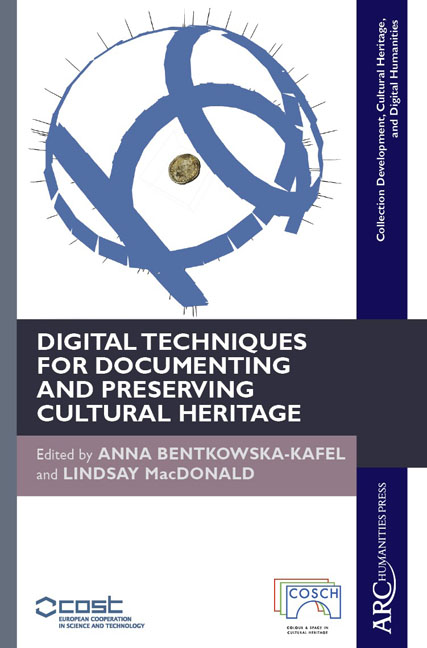Chapter 10 - Communicating Interdisciplinary Scholarship: Conclusions from COSCH
Published online by Cambridge University Press: 26 January 2021
Summary
ABSTRACT
The study of cultural heritage requires the expertise of many disciplines as different as history and optical science. Each discipline brings its discrete research methods and know-how. Complementary knowledge is gained, gradually, through effective collaboration, which is not always easy. The articulation and communication of respective research questions, ways of addressing these questions, and expected outcomes, are a challenge in all collaborative projects. This concluding chapter discusses how the COST Action, Colour in Space in Cultural Heritage, has addressed and managed this challenge, through the case studies described in the present book and other activities. The authors draw conclusions from COSCH research activities and note some general points that bear on the success of diffusion of interdisciplinary research and its future.
Keywords: interdisciplinary research, communication, cultural heritage, science, optical technologies, COSCH
It is everyone's responsibility to improve interdisciplinary communication, something that starts and ends with willingness, plenty of patience, and an open mind.
(Darren Kocs 1993, 1060)The study and documentation of cultural heritage require the expertise of many disciplines as different as history and optical science. Each discipline brings its discrete research methods and know-how. Complementary knowledge is gained, gradually, through effective collaboration. The articulation and communication of respective research questions, ways of addressing these questions, and expected outcomes, are challenges common to all collaborative projects. This concluding chapter discusses how the COST Action, Colour in Space in Cultural Heritage (COSCH) has addressed and managed these challenges, through the case studies, described in the preceding chapters, and other research and training activities conducted between 2012 and 2016. We reflect on earlier projects that also shared the goal of “bridging the gap” between disciplinary approaches and mindsets, specialist research methods and tools, while showing the distinctive approach of the COSCH network. We draw conclusions from COSCH's four-year engagement in the interdisciplinary debate by noting general points that, in our view, bear on the success of future research and its diffusion.
On the Perceived Notion of “Two Cultures”
“The scientist has the habit of science, the artist the habit of art.”1 The concept of “two cultures” has persisted since it was forcefully proposed in the 1950s. It is not only widely understood, but also cultivated in the English-speaking academia, as evidenced by a recent, double issue of Interdisciplinary Science Reviews (James 2016) that elaborates on its legacy.
- Type
- Chapter
- Information
- Publisher: Amsterdam University PressPrint publication year: 2018



